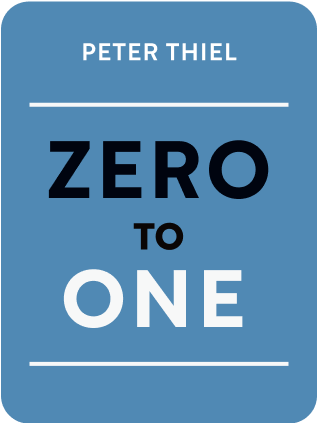

This article is an excerpt from the Shortform summary of "Zero To One" by Peter Thiel. Shortform has the world's best summaries of books you should be reading.
Like this article? Sign up for a free trial here .
Are you looking for a business startup checklist? What kinds of things do you need to know before launching your startup?
A business startup checklist can help you stay organized and keep track of your goals. With your business startup checklist, you’ll be able to plan for your launch and beyond.
Startup Thinking for Your Startup Checklist
For several reasons, startups consisting of a few people with a mission are the source of most new technology.
Big organizations don’t often produce new technology because they tend to avoid risk. People working alone seldom produce new technology either. A brilliant loner might produce great art, but she wouldn’t have the means to create a new industry.
Startups work because it takes multiple people to create new technology, but also smallness for momentum and flexibility. Small companies encourage and are conducive to new thinking because they know new thinking is their biggest asset.
Zero explores the questions that companies creating new things must answer in order to succeed. It’s a starting point rather than a manual. The first job of a startup is to question everything and rethink business from the beginning. You can use this new-business startup checklist to keep track of your plan and progress.
A Startup Checklist for Success
In summary, a startup won’t succeed without a business plan that addresses each of the following questions on this new-business startup checklist. If your answers are weak, your company will fail—however, with a solid answer for each, you’ll be on your way to having a great business.
- Engineering: Is your technology a significant advance or only incremental improvement?
- Timing: Is this the right time to sell this technology?
- Monopoly: Are you targeting a big share of a small market?
- People: Do you have the right people on your team?
- Distribution: Do you have a plan to sell your product?
- Durability: Will you dominate your market in the next 10 to 20 years?
- Secret: Have you identified a unique opportunity overlooked by everyone else?
Startup Checklist Basics: Key Decisions, Building a Team
When starting a company, it’s important to choose leaders who have the right technical knowledge and whose skills are complementary. Equally important, however, is how well the founders know each other and work together. You also need a structure and clearly defined roles so everyone is aligned to move the organization forward. This foundation should be a part of your new-business startup checklist.
For effective alignment, you must make three decisions:
- Ownership: Who will own the company’s equity. Ownership is typically divided among founders, employees, and investors.
- Possession: Who will run the company day-to-day. It may be a founder/CEO or manager and employees.
- Control: Who will govern the company. A board of directors (usually consisting of founders and investors) maintains control.
Compensation
A CEO of a venture-funded startup shouldn’t be paid more than $150,000 a year. High pay (more than $300,000) encourages him to protect his salary by defending the status quo and minimizing problems rather than exposing and fixing them.
Other advantages of low CEO pay are that it:
- Encourages the executive to focus on increasing the value of the company.
- Motivates employees to work harder. By working for lower pay, an executive demonstrates his commitment to the company and its mission. Employees will follow his example.
By the same token, over-paying employees encourages them to focus on what the company is doing in the present instead of thinking about how to increase the company’s value in the future. Cash bonuses also encourage short-term thinking. Offering equity or part ownership of the company shifts the focus to the future.
Recruiting
The next step on your business startup checklist is hiring the best employees. The first few employees in a startup might be attracted by exciting roles or equity. But beyond your first round of hires, you must be able to articulate to the 20th candidate why she should want to join your company.
Your answers need to be specific to your company. They should address:
1) Your mission: Explain what makes your mission unique and compelling—what’s the important thing you’re doing that no one else is doing?
2) Your team: Show potential employees that the people on your team are the kind of people they want to work with. Show recruits how your company is a unique match for them.
Don’t cite your perks—you don’t want people working for you who can be convinced to do so by things like laundry pickup because that’s an indication of superficiality. Your unique mission is what should count.
What Company Could You Build?
As you go through your business startup checklist, think about your company. What kind of company is it? These questions can help. A key question that Thiel poses to entrepreneurs is, What valuable company hasn’t been started yet? Answering it requires discovering a secret—for instance, seeing untapped potential or solving a problem by looking at it in a new way.
Think of a problem, inconvenience, or opportunity you encountered in the past week. What was it?
Why does this problem still continue to exist? What are people not getting right about solving this problem?
What might a radical business solution to this problem/opportunity look like?
If you had unlimited money, how could you build a company to address this problem or opportunity?
Use this business startup checklist as a reference. Of course, it’s not the end of everything that goes into starting your business. Remember that the business startup checklist is available whenever you need to check in on your goals or tasks.

———End of Preview———
Like what you just read? Read the rest of the world's best summary of Peter Thiel's "Zero To One" at Shortform .
Here's what you'll find in our full Zero To One summary :
- Why some companies genuinely move the world forward when most don't
- How to build a company that becomes a monopoly (and why monopolies aren't bad)
- Silicon Valley secrets to selling products and building rockstar teams






